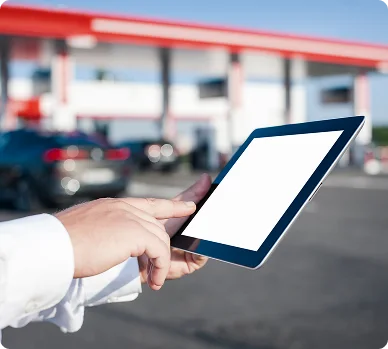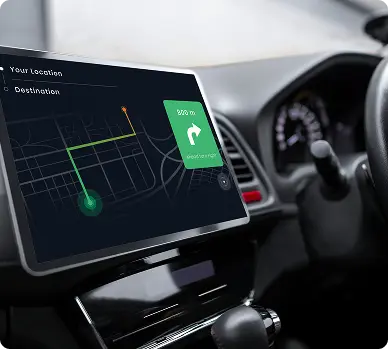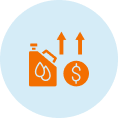A fleet fuel management system is an integrated platform that tracks, analyzes, and optimizes fuel usage across an entire fleet. At its core, it brings together hardware (fuel sensors, IoT devices, telemetry), data processing (analytics, AI/ML models), and user interfaces (dashboards, alerts, reporting) to give fleet operators real-time control over fuel dynamics.

Sensors in vehicle fuel tanks, OBD-II ports, or inline fuel lines capture metrics like fuel level, flow rate, and refills.

These measurements are transmitted via cellular or connected IoT networks to a central system, often with GPS context.

Algorithms analyze patterns to detect anomalies (sudden drop, unauthorized refuel) and forecast fuel needs.

The system triggers warnings on overspending, irregular usage, or suspected fuel theft.

Fleet managers use dashboards to compare consumption, evaluate fuel savings, and plan refuels strategically.
By combining fuel monitoring device data with location and vehicle performance inputs, the system empowers you to reduce waste, improve accountability, and get precise visibility into fuel costs. It forms the backbone of proactive fuel fleet management software, enabling informed decision-making in every route and vehicle.
Fuel is one of the top variable costs in any fleet. Inefficient fuel use, due to leaks, theft, suboptimal routing, or poor driving behavior, can erode margins fast. A robust fleet fuel management system addresses these challenges head-on by enabling visibility, control, and accountability.

By identifying inefficiencies, you unlock tangible fleet fuel savings. Even small gains (1–3%) scale massively in large fleets.




In short, fuel management isn’t a “nice to have,” it’s mission-critical. For any logistics or transport operator seeking profitability, resilience, and a competitive edge, deploying a strong fuel monitoring system for vehicles isn’t optional; it’s essential.
Fuel is one of the top variable costs in any fleet. Inefficient fuel use, due to leaks, theft, suboptimal routing, or poor driving behavior, can erode margins fast. A robust fleet fuel management system addresses these challenges head-on by enabling visibility, control, and accountability.

By identifying inefficiencies, you unlock tangible fleet fuel savings. Even small gains (1–3%) scale massively in large fleets.




In short, fuel management isn’t a “nice to have,” it’s mission-critical. For any logistics or transport operator seeking profitability, resilience, and a competitive edge, deploying a strong fuel monitoring system for vehicles isn’t optional; it’s essential.

A fleet fuel management system is not a single tool but a collection of integrated components working together to provide complete visibility and control over fuel usage. At its foundation are fuel monitoring devices installed in vehicles, often inside fuel tanks or fuel lines. These sensors track parameters like fuel level, refueling events, and sudden drops that may indicate theft or leaks.
The strength of the system lies in integration, combining telematics, analytics, and IoT devices into a cohesive framework for maximum efficiency and security.
Telematics transforms the way fleets monitor and optimize fuel. By combining vehicle data, GPS tracking, and advanced sensors, telematics-powered fleet fuel management systems provide real-time visibility into fuel consumption patterns. Managers can track idling, speeding, harsh braking, and route deviations—factors that directly influence fleet management fuel costs.
The result is a more transparent, controlled, and efficient operation. By aligning telematics with fleet fuel services, businesses achieve measurable fleet fuel savings, while also reducing carbon emissions, a win for both profitability and sustainability.

Logistics providers with long-haul trucks, public transport operators managing buses, and construction companies running heavy machinery all benefit from precise management of fuel.




By combining a fuel monitoring system for vehicles with telematics, both small and enterprise fleets can future-proof operations, improve profitability, and align with sustainability goals. It’s a system for anyone serious about turning fuel into a controlled, optimized resource rather than an unpredictable expense.

Logistics providers with long-haul trucks, public transport operators managing buses, and construction companies running heavy machinery all benefit from precise management of fuel.




By combining a fuel monitoring system for vehicles with telematics, both small and enterprise fleets can future-proof operations, improve profitability, and align with sustainability goals. It’s a system for anyone serious about turning fuel into a controlled, optimized resource rather than an unpredictable expense.
Choosing the right fleet fuel management system begins with identifying features that directly impact visibility, accountability, and cost reduction.
At the core, a fuel monitoring device is essential to measure real-time consumption, refueling events, and detect anomalies such as theft or leakage.

This data should seamlessly feed into a centralized fuel fleet management software, enabling managers to analyze patterns and create actionable insights.

A robust system also includes fuel inventory management software, especially for businesses with depots or on-site fueling. This ensures every liter is tracked, from storage tanks to vehicles, reducing discrepancies and losses.

Integration with GPS trackers with fuel monitoring allows managers to correlate fuel usage with route efficiency and driver behavior, ensuring accountability across every trip.

Look for advanced reporting capabilities, alert systems for irregular usage, and compatibility with telematics platforms.

A good system should also scale easily with fleet size and support compliance reporting.

Ultimately, the right solution goes beyond tracking; it acts as a fuel control platform, giving businesses the ability to lower costs, increase efficiency, and optimize overall fleet management fuel consumption with data-backed precision.

Fuel expenses represent one of the largest cost centers in fleet operations, making precise monitoring essential. A modern fleet fuel management system provides organizations with the visibility, control, and intelligence needed to address inefficiencies and rising costs. Beyond simple tracking, it creates a connected ecosystem of fuel monitoring devices, telematics, and fuel fleet management software that delivers actionable insights.

For businesses managing dozens or even hundreds of vehicles, such a system ensures accountability at every stage, from refueling to consumption. By integrating with fuel inventory management software, fleets can also manage bulk fuel storage, preventing discrepancies and losses. This makes the management of fuel a structured, data-driven process rather than guesswork.

The real value lies in long-term savings and operational efficiency. By using a fleet fuel monitoring system, companies reduce wastage, identify misuse, and strengthen driver accountability. Over time, this translates into lower fleet management fuel costs, improved sustainability, and greater profitability. Investing in a reliable solution isn’t just about reducing expenses; it’s about building a competitive advantage in an industry where margins are often tight.
This makes investment not just a cost-control strategy but a pathway to sustainable fleet profitability and higher ROI on fuel management system
A fleet fuel management system delivers measurable improvements across multiple areas of fleet operations. Here are the five most impactful benefits:
Real-time tracking with fuel monitoring devices ensures every drop is accounted for, helping fleets lower overall fleet fuel cost and achieve lasting fleet fuel savings.
A unified fuel fleet management software platform consolidates data from multiple vehicles, tanks, and trips, enabling informed decision-making.
Driver actions have a direct impact on fleet management fuel consumption. A fleet fuel management system helps track these behaviors and provides managers with actionable insights to improve efficiency. Key factors include:
Educating drivers with feedback from fuel fleet management software encourages efficient practices and promotes safer, more sustainable operations.
Ongoing insights from a fleet fuel monitoring system allow managers to spot patterns, reward efficient drivers, and address inefficiencies quickly.
Fuel theft is one of the most significant risks in fleet operations, and proactive measures are essential. A reliable fleet fuel management system enables robust safeguards, such as:

A vehicle fuel monitoring system detects unusual fuel level drops, signaling possible theft or leakage.

Sudden refueling events outside approved areas trigger instant notifications, ensuring stronger fuel control.

Combining a GPS tracker with fuel monitoring in India helps cross-check fuel usage against actual vehicle location and trips.

Linking fuel inventory management software with fleet fueling records ensures accurate accounting and prevents discrepancies.

Transparent data from a fleet fueling system promotes responsibility, making drivers aware that every transaction is being monitored.
Effective fleet fuel management is not about a single tool; it’s about combining smart strategies, technology, and accountability. The first step is adopting a reliable fleet fuel management system that integrates telematics, fuel monitoring devices, and fuel fleet management software into one platform. This centralization ensures all fuel-related data, from purchase to consumption, is visible in real time.
Ultimately, best practices are about consistency. Fleets that continually measure, analyze, and act on insights from a fleet fuel monitoring system are the ones that reduce costs, enhance sustainability, and improve overall performance.










A modern fleet fuel management system plays a central role in lowering expenses and maximizing operational efficiency. Here’s how it reduces costs across the board:

Real-time insights from fuel monitoring devices help detect inefficiencies, leading to measurable fleet fuel savings.



Better driving habits, tracked through fuel fleet management software, extend vehicle life and reduce repair expenses.


A modern fleet fuel management system plays a central role in lowering expenses and maximizing operational efficiency. Here’s how it reduces costs across the board:

Real-time insights from fuel monitoring devices help detect inefficiencies, leading to measurable fleet fuel savings.



Better driving habits, tracked through fuel fleet management software, extend vehicle life and reduce repair expenses.


Selecting the right fleet fuel management system is about aligning features with your business goals. Here are key points to guide your decision:

Choose a system that adapts to your fleet’s size and growth, from a few vehicles to large-scale operations.

The system should integrate with fuel fleet management software, telematics, and existing ERP tools for unified data visibility.

Ensure it includes a reliable fuel monitoring device or fuel tracking device that delivers accurate, real-time data.

A robust fuel monitoring system for vehicles should provide alerts for anomalies, preventing fuel theft and misuse.

Comprehensive dashboards for fleet fuel services and fleet management fuel cost analysis help track performance with clarity.

Opt for solutions that monitor idling, optimize fleet management fuel consumption, and support eco-friendly practices.

Partner with trusted fuel management system companies that offer strong customer support, updates, and proven track records.

Fleet managers use dashboards to compare consumption, evaluate fuel savings, and plan refuels strategically.
The right system doesn’t just track—it transforms operations, enabling transparency, cost savings, and long-term sustainability.
Businesses in logistics, transport, and construction primarily use fleets.
Fleet sizes vary, but most commercial fleets range between 5 and 500 vehicles.
They include maintenance logs, compliance records, and driver performance reports.
Yes, a fleet manager ensures smooth operations and efficiency across vehicles.
Yes, a fleet fuel management system is essential to cut costs and improve fuel accountability.